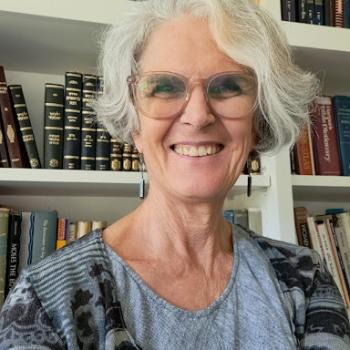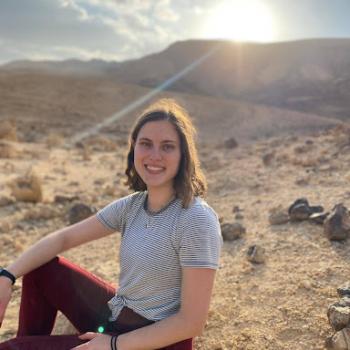By Alyssa Coffey, Hebrew College Rabbinical School student
Ki Teitzei Deut. 21:10-25:19
Parashat Ki Teitzei begins by addressing the ancient Israelites’ warriors, instructing them in very specific matters of battlefield-conduct: how to treat women whom their forces have taken captive in the context of war. The details, needless to say, are disturbing and upsetting:
When you go out to battle against your enemies and YHWH your God gives him into your hand, and you take-captive his captives, and you see among the captives a woman beautiful of form, and you desire her, and would take her for yourself as a wife: you are to bring her into the midst of your house; she is to shave her head and to do her nails, she is to put off her garments of captivity from herself and is to sit in your house and weep for her father and her mother, for a month of days; after that you may come in to her and espouse her, and she may become your wife. Now it shall be: if you are not pleased with her, you must send-her-free, in her person, but sell, you may not sell her, for silver; you are not to deal treacherously with her, since you have humbled her! (Deut. 21:10-14, translation by Everett Fox)
The Torah here appears to condone sexual violence amidst the inherent violence and absent empathy of war. Reading these verses, I unfortunately cannot help but be reminded of contemporary events. Nearly two years after October 7, the horrors continue: images of emaciated hostages (dozens remain in Gaza) mingle with those of emaciated Gazan children. Razed neighborhoods and streets are re-entered by soldiers, civilians take to the streets across Israel in protest, crowds clamor in Gaza for food. I could go on: the sum total of trauma and grief is more than can be expressed. As this destruction continues to harden hearts, it does, I admit, seem more far-fetched and hopeless to imagine a future beyond this totality of brokenness.
I am, however, especially reminded of an encounter from March of 2024. On a Shabbat afternoon walk, meandering through Jerusalem’s hilly streets and alleyways, keenly aware of the calamities 100 kilometers from my apartment but unable to visually identify them amidst the leafy streets and light-reflecting stones – I happened upon a place I had been avoiding. The tent which families of those held hostage in Gaza had erected, as a sign of solidarity, protest, and mourning, was covered in familiar red posters. A wall was left open on one side, like a sukkah, and dozens streamed by on their way home from Shabbat meals without a glance inside. This, too, had become part of the scenery.
I am not proud to admit it, but the Hostage Families’ tent intimidated me terribly: I did not know how to sit alongside or bear witness to that level of suffering. All at once, I could not look away. Standing in the entryway, my eyes met with those of the tent’s sole occupant: a woman sitting on the floor, her back to a cluster of yellow plastic chairs. “Would you like visitors?” I asked. “Come and sit.”
We spoke for a few minutes in Hebrew: she wanted to know where I was from, for how long I had been in Jerusalem, what I hoped to do upon finishing my studies, what else I had done that day. As I tried to ask my conversation partner about herself, most of my questions were deflected back towards me. Not wanting to overstay my welcome or force an unwanted conversation, I asked if there was anything I could do to be helpful: tidy up the chairs? Take care of the used paper plates and cutlery scattered about the snack table?
What I need, she explained somewhat hesitantly, is help with this sign. There was a protest in a few hours, and she was worried she would not be able to finish painting the banner alone.
As someone whose shabbat practice does not include writing or drawing, it was obvious to her that I was religious: I was wearing a long skirt, carried with me only a key to my apartment, and had already told her that I was in Jerusalem to study Torah, with hopes to become a rabbi in America. Even before reading the sign, my decision has been made. “There are 19 Women Held Hostage in Gaza,” proclaimed the large outlines of Hebrew letters. Sitting on the floor in near complete silence, the two of us painted the sign.
I tell this story not to share about myself, but to share what it means for me to see the most painful realities of our world – war, famine, killing of innocents, unrelenting violence – within our Torah and ourselves, as we carry its teachings of peace, compassion, and shared humanity alongside us as well. Even the words of this week’s haftarah – one of seven representing consolation between Tisha B’Av and Rosh Hashanah, feel like cold comfort:
For the mountains shall depart, and the hills be removed; but My faithful love shall not depart from thee, neither shall the covenant of My peace be removed, says the Lord that has mercy on thee. (Isaiah 54:10, Koren)
At such a juncture in our calendar as this, prayer feels more accessible than study. Some sliver of my yearnings are held by these excerpts from my teacher Rabbi Sharon Cohen Anisfeld’s version of El Malei Rahamim:
אל מלא רחמים
God full of mercy,
Womb of the world,
In whom there is room enough
for all life to flourish
From whom there is blessing enough
For all life to be nourished –
We call out to You,
Broken-hearted.
Shelter those who witnessed
unspeakable brutality
And whose walls could not protect them.
Carry those who were caught or cornered,
unable to escape
destruction, degradation, despair.
Lift up those who searched
for sustenance or safety,
longing for the embrace of home.
Alyssa Coffey (she/her) is a rabbinical student at Hebrew College, where she also serves as Editor of the 70 Faces of Torah blog. Prior to rabbinical school, she studied religion and history at Hampshire College, worked at a Jewish social service organization in Chicago, and spent two years studying in Jerusalem at Pardes. When not learning Torah, Alyssa is often knitting, spinning yarn, or solving puzzles.














